

A missile attack on a civilian grain shipment has been confirmed for the first time in the conflict between Russia and Ukraine
A Saint Kitts and Nevis-flagged bulk carrier was hit by a missile after leaving the Ukrainian port of Chernomorsk, the first confirmed attack on a Black Sea merchant ship in months this year, Reuters reported.
According to maritime security sources, the vessel attacked was Aya, a bulk carrier with a capacity of 27,239 tonnes. The ship was transporting grain to Egypt when it suffered damage to its port side, damaging a cargo hold and a crane on board.
The ship was built in 1997 and is currently operated by VRS Maritime Services.
The company recommends that ships calling in the Black Sea conduct a comprehensive dynamic navigational threat assessment. In the event of a drone or missile attack, crew members should remain in the ship's superstructure, which is located above the waterline.
According to Reuters, the Aya was hit in Romanian waters near the mouth of the Danube River in the Black Sea. However, from the trajectory of the "Aya", it appears that the ship was attacked in international waters.
Ukrainian President Volodemir Zelensky confirmed the incident via social media. He said a Russian missile had hit an "ordinary civilian ship" that was carrying a cargo of wheat and was leaving Ukrainian waters for Egypt.
He also posted multiple images showing the ship's damaged crane and other damage.
It's been 11 months since the first attack
The last confirmed attack on a Black Sea merchant ship occurred in early November, when a Soviet-style Kh-31P air-to-surface missile hit the 91,800-ton Kmax Ruler bulk carrier. The Liberian-flagged bulk carrier was preparing to carry a shipment of iron ore from Ukraine to China.
According to Reuters, a Russian missile hit a bulk carrier entering Ukraine's Black Sea port in the Odessa region on November 8, killing a pilot and injuring three crew members and a port worker.
Since the outbreak of the conflict between Russia and Ukraine on February 4, 2022, a number of merchant ships have been hit and damaged in the fighting. In the 20 days ending February 24, 2022 alone, at least three merchant ships were damaged in the conflict that followed the outbreak of hostilities.
According to reports, after the escalation of the Russia-Ukraine conflict in February 2022, a large number of Ukrainian agricultural products were once blocked by the Black Sea port and could not be shipped out. Under the mediation of Turkey and the United Nations, Russia and Ukraine signed an agreement on the export of agricultural products from the Black Sea port in July 2022 to ensure the smooth access of Russian and Ukrainian food and fertilizer to the international market. The agreement has since been extended three times, but Russia refused to renew it after it expired on July 17 last year.
According to the Observer network, Russian President Vladimir Putin explained the decision in July last year, saying that Western countries had "completely distorted the essence of the agreement" and used it for "political blackmail" and "to help European companies gain profits," resulting in European companies benefiting and Russia suffering losses. Mr. Putin said Moscow was not opposed to the agreement itself. If all the conditions initially agreed upon in the agreement are met, Russia will consider the possibility of returning to the Black Sea agreement.
At the same time, the Russian Defense Ministry also announced that in view of the termination of the Black Sea agreement and the closure of the humanitarian corridor at sea, from 0:00 Moscow time on July 20 last year, all vessels sailing in the Black Sea waters to Ukrainian ports will be considered as potential "military cargo carriers", and the country represented by such vessels flying the flag will be considered as participating in the conflict and supporting Ukraine.
Last August, Ukraine established its own shipping corridor. The temporary Black Sea route runs along the west coast of the Black Sea before sailing out of Ukrainian waters and south past Romania and Bulgaria. According to Ukrainian officials, since the operation of the route, Ukraine has exported more than 64 million metric tons of goods to 46 countries, and 43.5 million metric tons of agricultural products in the past year alone.
The outbreak of the conflict between Russia and Ukraine has had a huge impact on the global food market. Traders told Reuters that the latest incident added to international concerns about tight supplies in the Black Sea grain export zone, causing wheat prices to rise. Data show that after the incident, US wheat futures rose 2% at one point, hitting a new high in two months.
According to maritime security sources, the vessel attacked was Aya, a bulk carrier with a capacity of 27,239 tonnes. The ship was transporting grain to Egypt when it suffered damage to its port side, damaging a cargo hold and a crane on board.
The ship was built in 1997 and is currently operated by VRS Maritime Services.
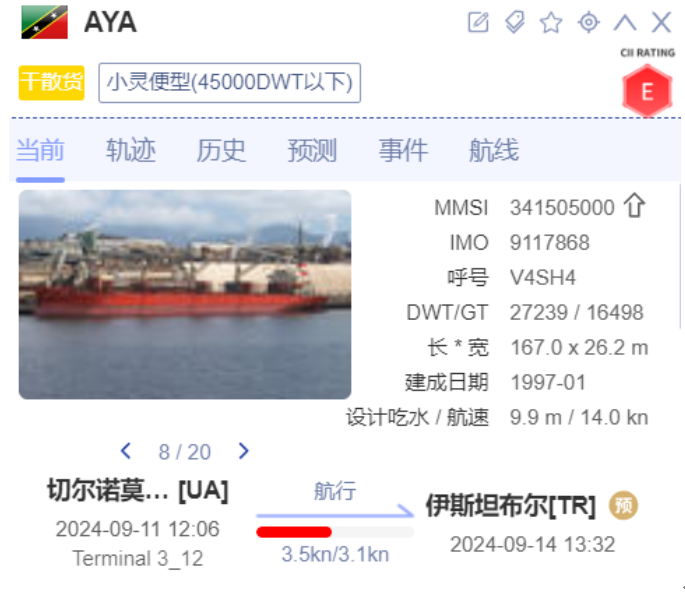
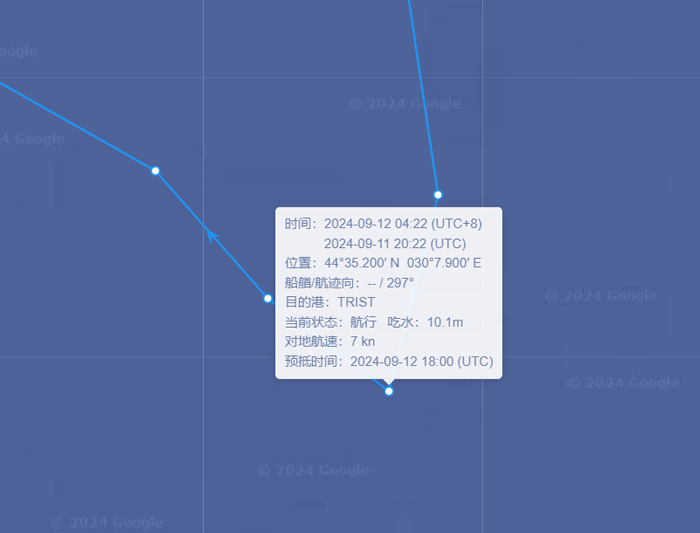
The company recommends that ships calling in the Black Sea conduct a comprehensive dynamic navigational threat assessment. In the event of a drone or missile attack, crew members should remain in the ship's superstructure, which is located above the waterline.
According to Reuters, the Aya was hit in Romanian waters near the mouth of the Danube River in the Black Sea. However, from the trajectory of the "Aya", it appears that the ship was attacked in international waters.
Ukrainian President Volodemir Zelensky confirmed the incident via social media. He said a Russian missile had hit an "ordinary civilian ship" that was carrying a cargo of wheat and was leaving Ukrainian waters for Egypt.
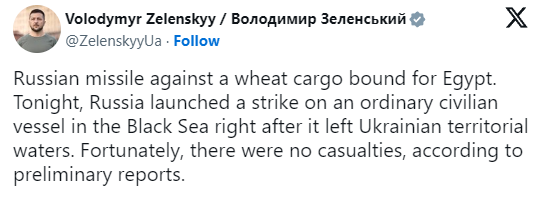
He also posted multiple images showing the ship's damaged crane and other damage.

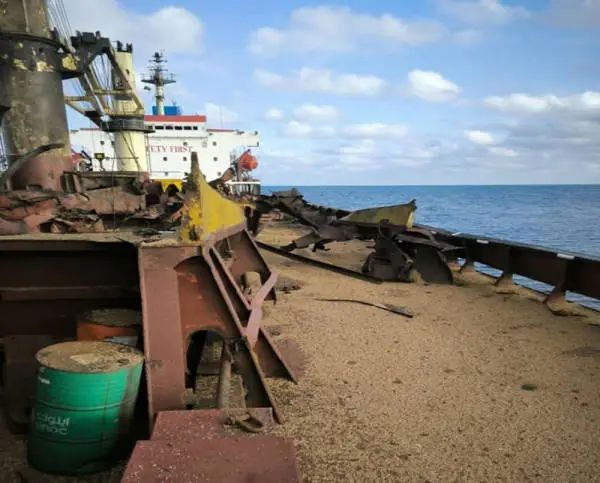
It's been 11 months since the first attack
The last confirmed attack on a Black Sea merchant ship occurred in early November, when a Soviet-style Kh-31P air-to-surface missile hit the 91,800-ton Kmax Ruler bulk carrier. The Liberian-flagged bulk carrier was preparing to carry a shipment of iron ore from Ukraine to China.
According to Reuters, a Russian missile hit a bulk carrier entering Ukraine's Black Sea port in the Odessa region on November 8, killing a pilot and injuring three crew members and a port worker.
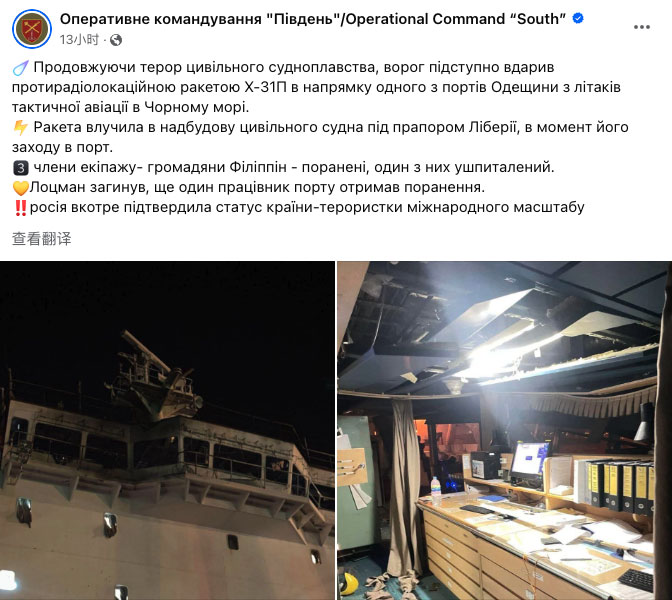
Since the outbreak of the conflict between Russia and Ukraine on February 4, 2022, a number of merchant ships have been hit and damaged in the fighting. In the 20 days ending February 24, 2022 alone, at least three merchant ships were damaged in the conflict that followed the outbreak of hostilities.
According to reports, after the escalation of the Russia-Ukraine conflict in February 2022, a large number of Ukrainian agricultural products were once blocked by the Black Sea port and could not be shipped out. Under the mediation of Turkey and the United Nations, Russia and Ukraine signed an agreement on the export of agricultural products from the Black Sea port in July 2022 to ensure the smooth access of Russian and Ukrainian food and fertilizer to the international market. The agreement has since been extended three times, but Russia refused to renew it after it expired on July 17 last year.
According to the Observer network, Russian President Vladimir Putin explained the decision in July last year, saying that Western countries had "completely distorted the essence of the agreement" and used it for "political blackmail" and "to help European companies gain profits," resulting in European companies benefiting and Russia suffering losses. Mr. Putin said Moscow was not opposed to the agreement itself. If all the conditions initially agreed upon in the agreement are met, Russia will consider the possibility of returning to the Black Sea agreement.
At the same time, the Russian Defense Ministry also announced that in view of the termination of the Black Sea agreement and the closure of the humanitarian corridor at sea, from 0:00 Moscow time on July 20 last year, all vessels sailing in the Black Sea waters to Ukrainian ports will be considered as potential "military cargo carriers", and the country represented by such vessels flying the flag will be considered as participating in the conflict and supporting Ukraine.
Last August, Ukraine established its own shipping corridor. The temporary Black Sea route runs along the west coast of the Black Sea before sailing out of Ukrainian waters and south past Romania and Bulgaria. According to Ukrainian officials, since the operation of the route, Ukraine has exported more than 64 million metric tons of goods to 46 countries, and 43.5 million metric tons of agricultural products in the past year alone.
The outbreak of the conflict between Russia and Ukraine has had a huge impact on the global food market. Traders told Reuters that the latest incident added to international concerns about tight supplies in the Black Sea grain export zone, causing wheat prices to rise. Data show that after the incident, US wheat futures rose 2% at one point, hitting a new high in two months.





